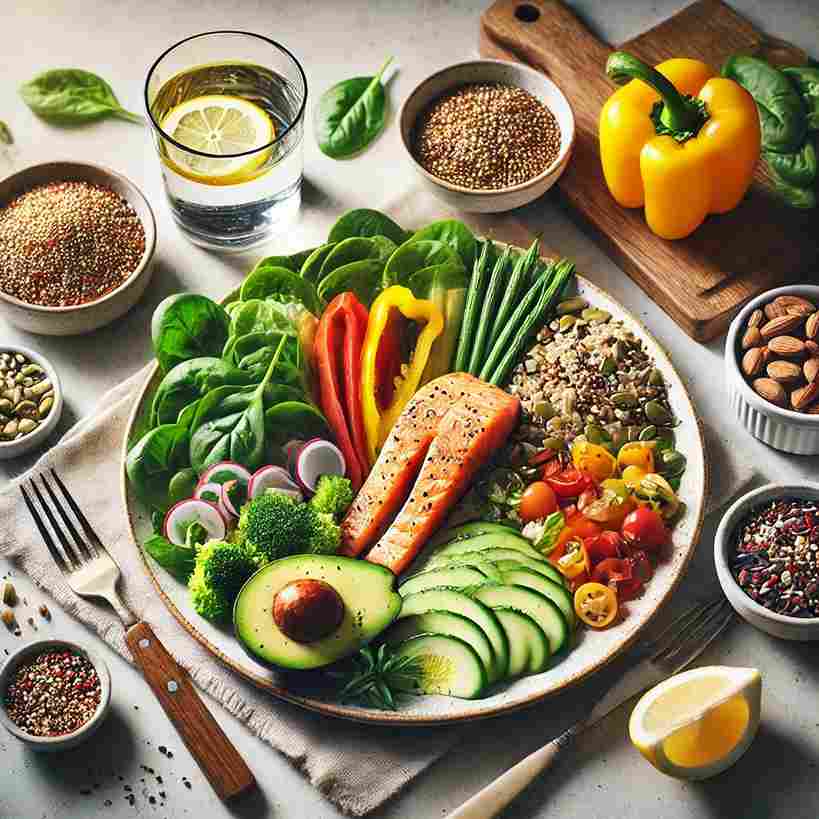Are you prepared to revolutionize your life through a bite? Healthy Eating in the right way is not just some trend or some thought present on the market for a few months—it’s truly the best way to improve your life. From boosting your energy to minimizing the threats posed by chronic diseases, there is no better recipe for health than taking appropriate meals. But let’s be honest; understanding what is out there as ‘healthy’ is analogous to solving a Rubik’s cube blindfolded. So don’t worry, this guide leads the way! Here you’ll find further information, hidden gems, useful guidelines, and science-equations of healthy eating.
The Principles of Healthy Eating: Build Your Wellness Foundation
Choose Nutrient-Dense Foods
Healthy eating isn’t about deprivation—it’s about choosing foods packed with nutrients.
These include fruits and vegetables: whole grains; lean meat and poultry, fish, beans and eggs; and healthy fats. Healthy foods contain nutrients in them; these nutrients are all that your body requires to function properly.
Why it matters: A survey by the CDC today shows that out of 10 adults, none consumes recommended servings of fruits and vegetables (https://www.cdc.gov/nutrition). Shocking, right?
A quick tip: Try to have as many colors on the plate as much as you can have at more than one meal.
Different colors in fruits and vegetables represent unique nutrients your body craves.
Balance is Key
Ever heard the saying, “Too much of a good thing is bad?” Even when eating healthy, balance matters. Overindulging in high-calorie “healthy snacks” like nuts or avocados can backfire if portion sizes aren’t monitored.
- Focus on the 80/20 rule: Eat nutritious, whole foods 80% of the time, and leave 20% for indulgences.
Benefits of Healthy Eating: Why Your Body Will Thank You
Boosts Mental Health
Did you know that what you eat can directly affect your mood? Research shows that a Mediterranean diet rich in omega-3s, vegetables, and lean proteins significantly reduces the risk of depression (https://pubmed.ncbi.nlm.nih.gov).
- Real Talk: Ever felt the “sugar crash” after devouring a donut? Swap it for a handful of almonds and experience sustained energy without the slump.
Enhances Physical Health
From your heart to your skin, eating well is like giving your body a daily maintenance check. Foods like salmon, walnuts, and spinach improve cardiovascular health, while citrus fruits enhance collagen production for radiant skin.
- Insight: A 2022 Harvard study found that individuals who followed healthy dietary habits had a 25% lower risk of early mortality (https://www.hsph.harvard.edu).
Breaking Down Misconceptions About Healthy Eating
Myth 1: Healthy Eating Is Expensive
Think you need to spend a fortune on exotic superfoods? Think again!
- Frozen fruits, canned beans, and whole grains are budget-friendly yet nutrient-dense staples.
Myth 2: Healthy Eating Is Time-Consuming
Prepping meals doesn’t mean slaving in the kitchen for hours.
- Hack: Batch cook on Sundays and use easy recipes for quick weekday meals.
Simple Tips to Kickstart Your Healthy Eating Journey
Plan Your Meals
A plan prevents last-minute junk food runs. Use a meal planner to organize breakfast, lunch, and dinner for the week.
Hydrate Smartly
Don’t confuse thirst with hunger. Keep a water bottle handy and sip throughout the day. Add lemon or cucumber slices for a refreshing twist.
Practice Mindful Eating
Slow down. Savor every bite, chew thoroughly, and listen to your body’s hunger signals.
FAQs
What is the simplest definition of healthy eating? Healthy eating therefore refers to the consumption of foods in their natural state and in adequate proportions to supply the essential nutrient requirements of Vitamins, Minerals, and macronutrients.
Can healthy eating really prevent diseases? Absolutely! Diets rich in whole foods can lower the risk of heart disease, diabetes, and even certain cancers (https://www.who.int).
Is healthy eating suitable for kids and seniors? Yes, the principles of healthy eating apply to all ages, though specific nutritional needs vary across life stages.
Is there any need to take supplements if am taking a balanced diet? Nearly all vitamins and minerals can be acquired from food products. However, they may be useful in case a deficiency is evident say the vitamin D or the iron. For a precise opinion, seek the help of a healthcare provider.
Are cheat meals allowed? Of course! Occasional indulgences help maintain balance and sustainability.
How do I stick to healthy eating when dining out? Opt for grilled instead of fried, and request sauces or dressings on the side.
Conclusion
Eating well is not a race but a marathon race that is run throughout one’s lifetime. Gradual improvements in nutrition eventually make a tremendous improvement in people’s health due to time compounding. Start making a change to your diet today and let each time you take a meal can mean the start of getting fit.



